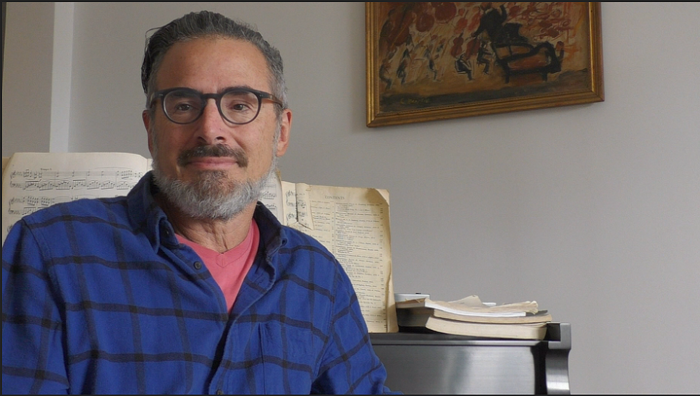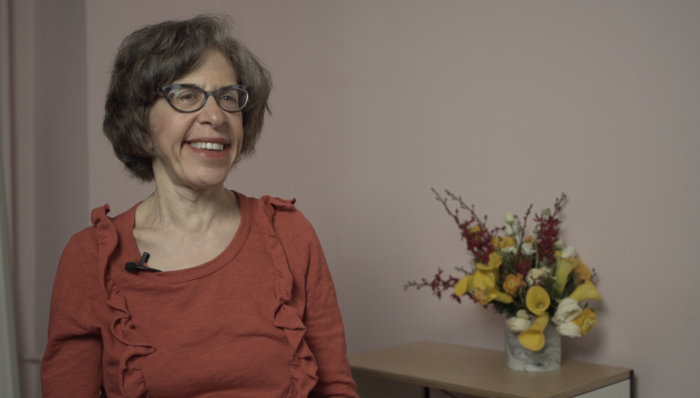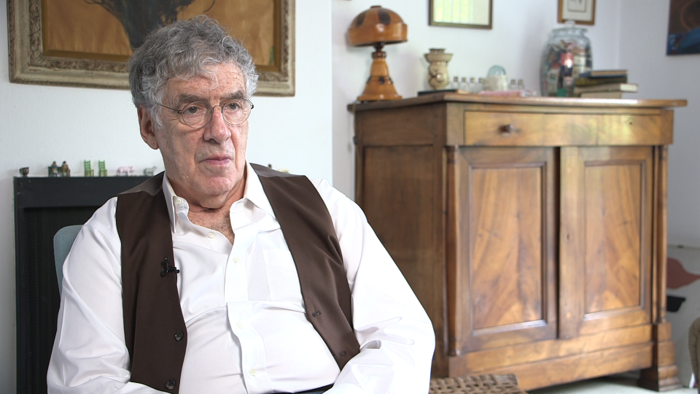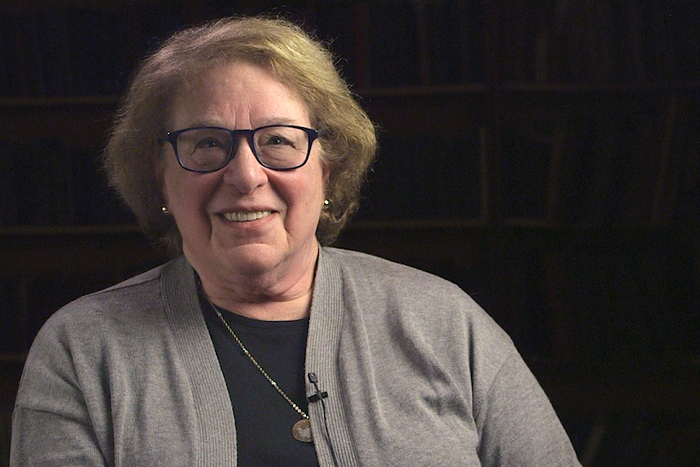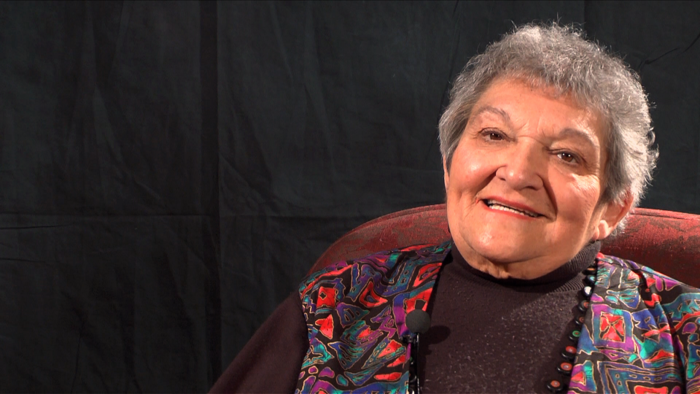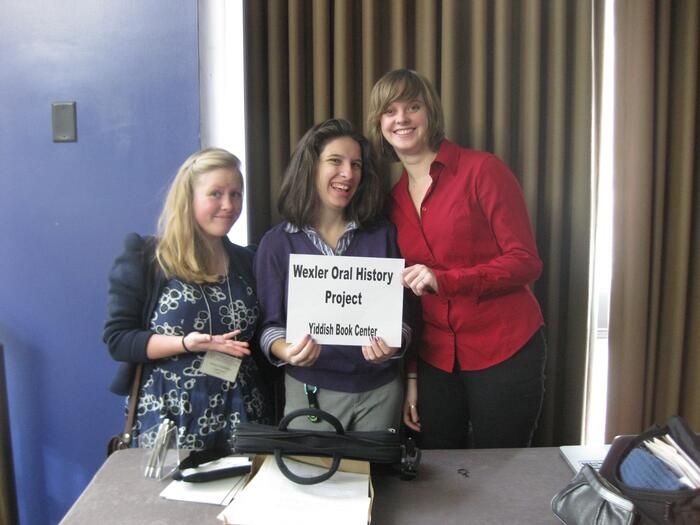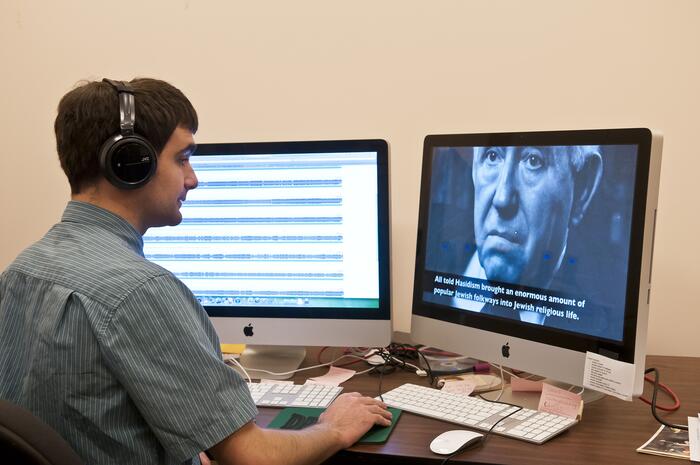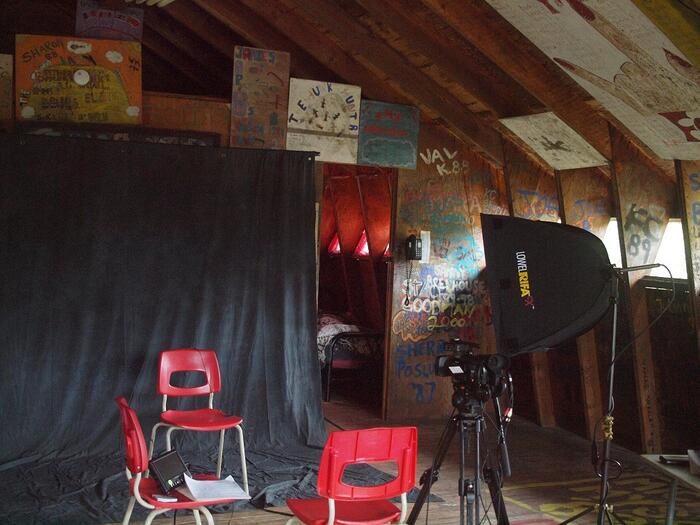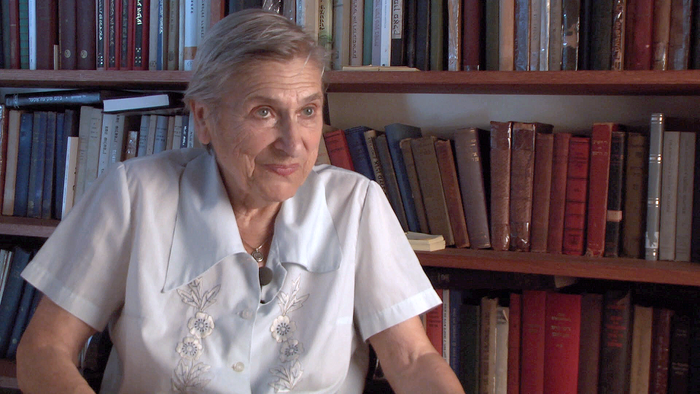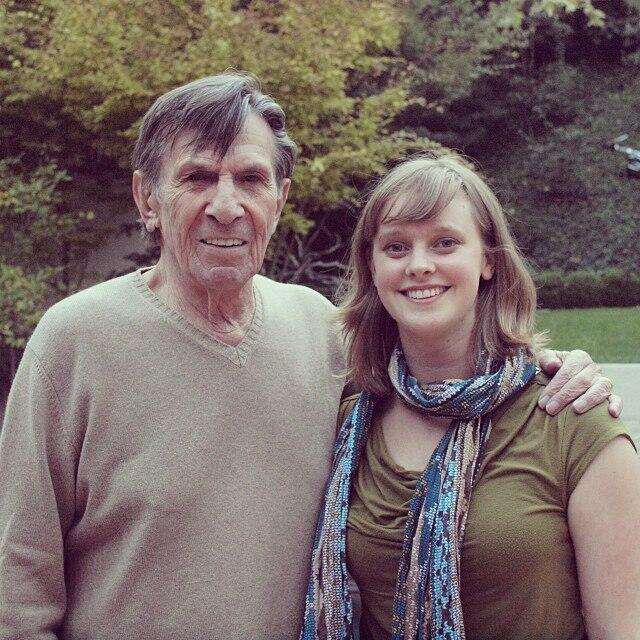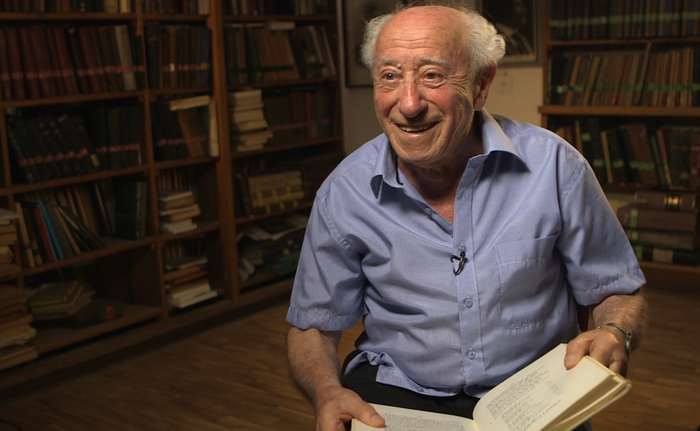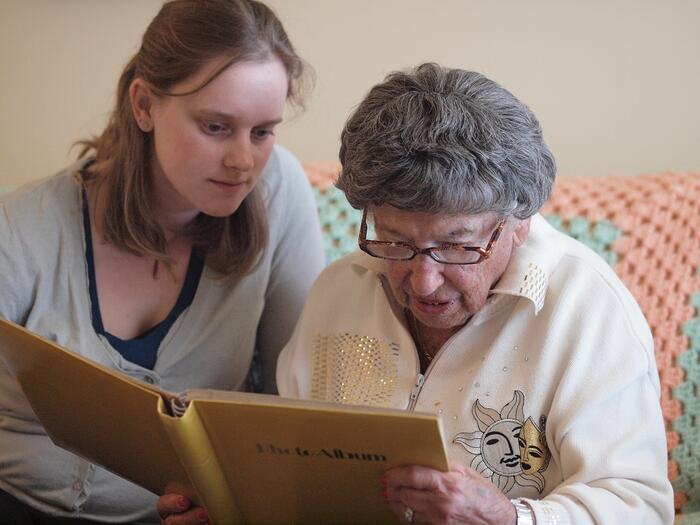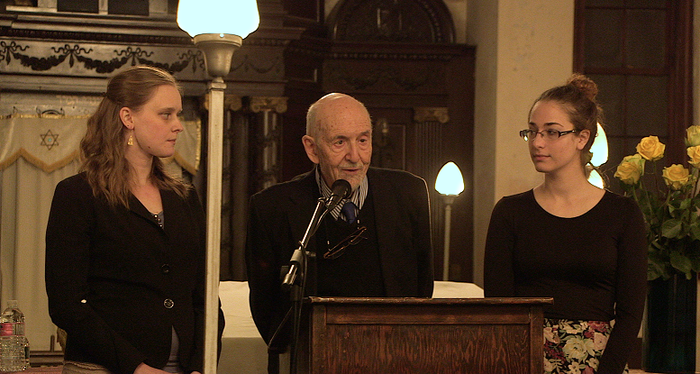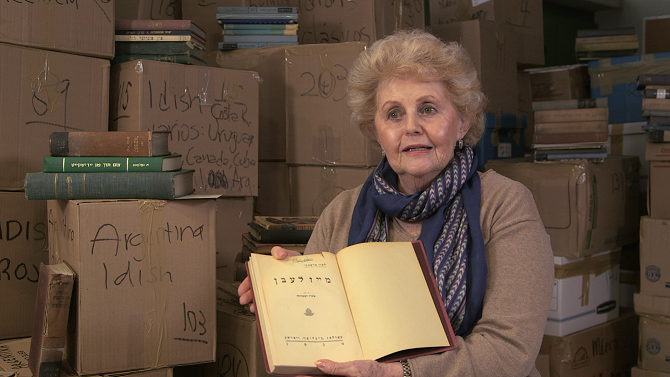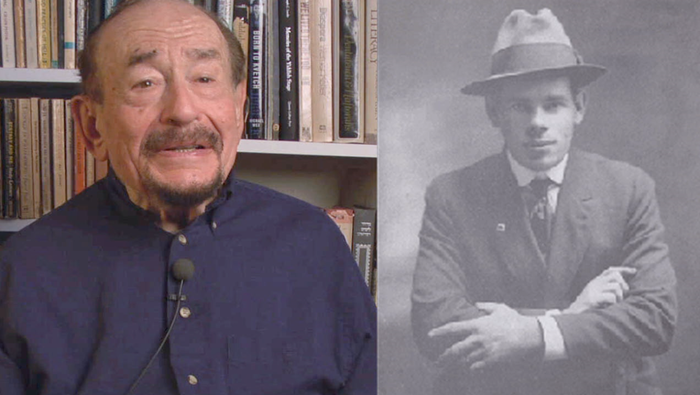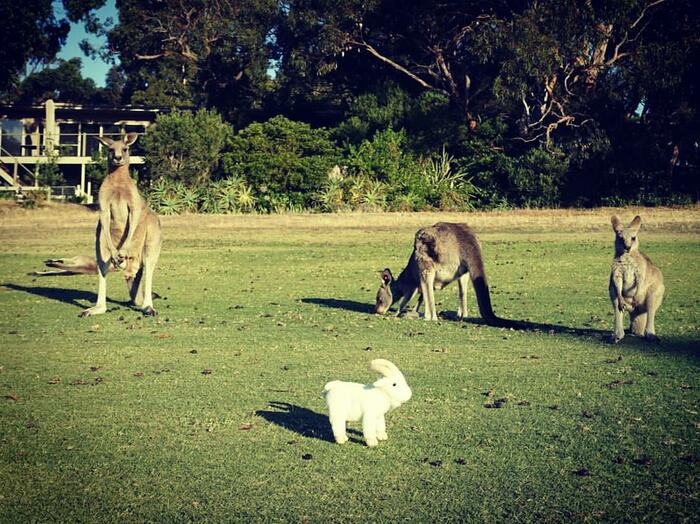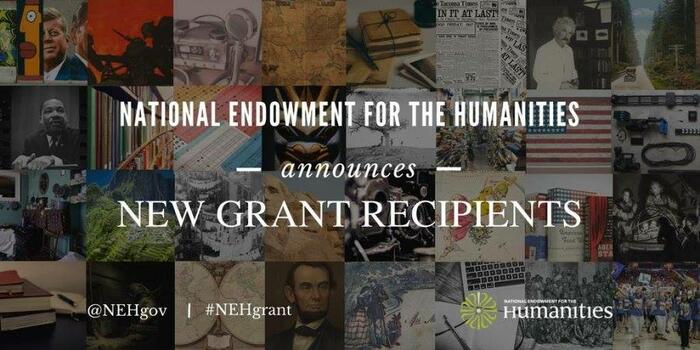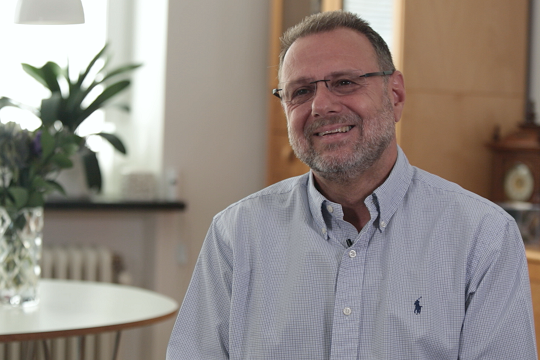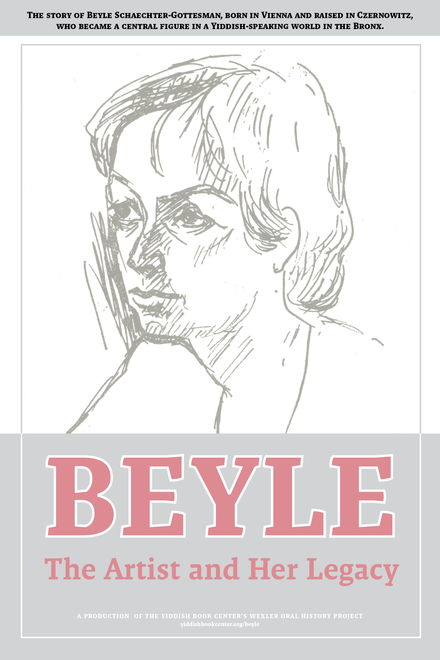2019: The Year in Review
News from the Yiddish Book Center’s Wexler Oral History Project
Tayere fraynt (Dear friends),
It’s hard to believe it’s been a decade since we first began recording oral histories. I’m not sure any of us working on the Project in those early years could have imagined we’d be where we are today, with a fully-accessible collection of over 1,000 oral history interviews with people of all ages and backgrounds about all aspects of Yiddish language and culture, recorded on five continents and in half a dozen languages.
In this newsletter, you’ll read about the 2019 release of our short documentary film, reflections from our oral history field fellows, and remembrances of those we’ve interviewed who’ve passed away this year, and you'll learn about a record-breaking year of international fieldwork. In addition, we look back at highlights from the past decade of recording oral histories about the legacy and changing nature of Yiddish language and culture.
Mit vareme grusn (warm regards),
Christa Whitney
Director, Yiddish Book Center's Wexler Oral History Project
Jump to…
BEYLE: The Artist and Her Legacy Released!
Nu, vi geyt es? (How’s It Going?): By the Numbers
Fieldwork Documenting a Yiddish-speaking Community in Northern Lithuania
Reflections from Our Oral History Field Fellows
Update on Our NEH Grant-funded Work to Increase Searchability of the Collection
Featured Interviews from 2019
Zikhroynom Livrokhe (Remembering Past Narrators)
Highlights from a Decade of Oral History
Follow Along with Our Work Throughout the Year
BEYLE: The Artist and Her Legacy Released!
This year we were excited to release our documentary film BEYLE: The Artist and Her Legacy about Yiddish artist and activist Beyle Schaechter-Gottesman. After its world premiere at the Yiddish Book Center's 2019 Yidstock: Festival of New Yiddish Music, we put a call out inviting individuals and organizations across the country and around the world to screen the film. We got a great response, and to date there have been 27 screenings of BEYLE across the US, Canada, and Europe—and many more in the works. From small Yiddish reading groups of just a few people to larger conferences and festivals like Yiddish Berlin and KlezKanada, we are thrilled that Beyle’s story is getting out into the world through our new film.
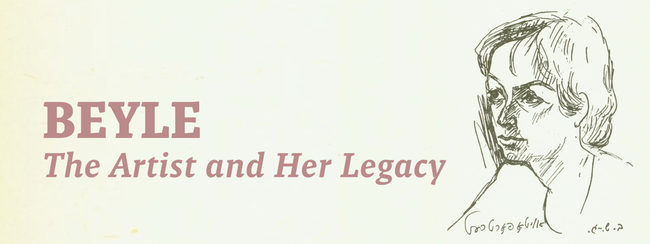
To learn more about the film and watch the film's trailer, visit: yiddishbookcenter.org/beyle.
If you're interested in organizing a screening of BEYLE: The Artist and Her Legacy in your community, please email us at: [email protected].
Nu, vi geyt es? (How’s It Going?)
1,018 interviews completed to date
758 full interviews accessible online
4,075 excerpts posted to our website
341,603 views of full interviews
4,524,021 views on YouTube
12,995 followers on social media across Facebook, Twitter, Instagram, and YouTube
Fieldwork Documents Yiddish-speaking Community in Northern Lithuania
In August of this year, Christa returned to Lithuania to conduct fieldwork with native Yiddish speakers. In 2012, our fieldwork was limited to the capital, Vilnius, known in Jewish history as the Yerushelayim d’lite (Jerusalem of Lithuania) for its prominence as a center of Jewish learning and cultural production. This time, we ventured up north to a lesser-known Jewish community in the Zamet (Samogitia) region of the country. The first interview was with Sania (Smuel) Kerbel, the president of the Shavel Jewish Community in Šiauliai, Lithuania (Shavel being the Yiddish name for the city). The oral history was recorded at the Jewish community building, which—with a lo-fi exhibit about local history, a shul in the basement, and an endless supply of espresso and cookies—serves as a gathering place for community members and visitors. Sania set Christa up on the enclosed porch of the building, and organized a stream of Yiddish speakers from the community to come by for her to interview over the two days she was there. In the end, she interviewed five people in their middle age in Yiddish about their family stories, and life in Soviet and then independent Lithuania. Through our interviews we learned that during the Soviet period it was dangerous to have Yiddish books in the home, and that there were no Yiddish schools, which meant that Yiddish was only a spoken language within the community. The work we did there was highlighted in the local newspaper, Skrastas.
Reflections from Our Oral History Field Fellows
Our oral history field fellow program helps to extend our fieldwork reach. Every few years, we train alumni of Yiddish Book Center programs in oral history methodology so that they can record interviews wherever they are and send them back to us in Amherst, Massachusetts for processing and preservation. Our three field fellows wrote about the exciting and important international fieldwork they’ve done over the past year.
“This past summer I had the wonderful opportunity to travel to Weimar, Germany, to Yiddish Summer Weimar (YSW), a month-long festival of Jewish music, language, and culture. While I was in Weimar, I conducted oral histories with fourteen of the festival's teachers and participants, many of whom travel year after year from the UK, the US, and places all over Europe to attend. One of my favorite interviews was with Bartlomiej Janiczak, a young Polish university student and polyglot, who is studying Yiddish as one of the many languages he speaks. He had been learning Yiddish from books and the internet but, prior to the festival, had never had a conversation with another Yiddish speaker. His interview conveys his passion for Yiddish and how meaningful the festival was to him; YSW gave him some of his first experiences of living Jewish culture and the opportunity to be in community with others who also care deeply for Yiddish.
I felt profoundly moved to see such a vibrant celebration of Jewish culture in Germany. Weimar is only several miles from Buchenwald, and I felt haunted by this proximity; not for a moment during my time there did I stop thinking about what was lost during the Holocaust. The festival, occurring so near to the site of such grief and horror, felt like an important act of healing and regeneration, and a joyful celebration of life.”
Nina Pick, field fellow based in Hastings-on-Hudson, New York–
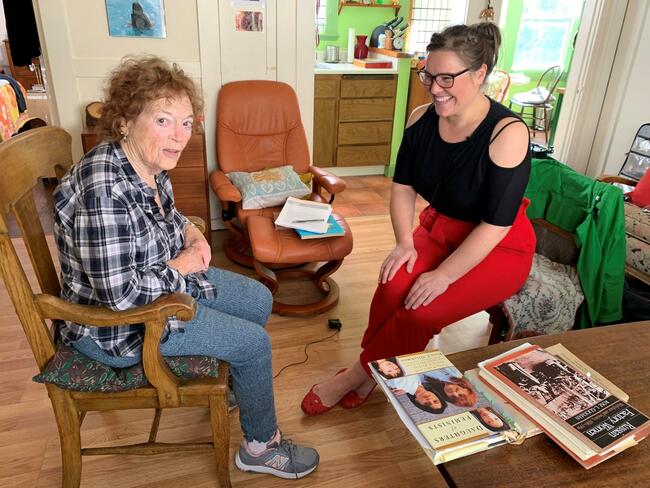
“May is my favorite time of year to visit Israel and I try to schedule my trips to enjoy the last strawberries available at the shuk (market) in Jerusalem. This year I shared these sweet fruits mostly with Holocaust survivors who had come to Israel from Poland, now living at the HaMavri house in Kfar Saba, a small town near Tel Aviv. We spoke in Polish, Yiddish, Hebrew, German and Russian. The oldest narrator, Simcha Charubiv [Bokser], was 117 years old, born in Zamość, Poland, who immigrated to Israel before World War II. My favorite stories came from Luba Gala in Ramat HaSharon, about her life in the Lower Silesia region, her favorite Polish songs, and how she met her husband while she was shopping for stockings in postwar Łódź!”
Agnieszka Ilwicka-Karuna, field fellow based in Richmond, California–
“Interviews with scholars have become my focus, and I really enjoy it. What I find most interesting is the intersection between acadmic work and personal interest in Yiddish language and culture. One of the highlights of my fieldwork was a day interviewing people at the Yiddish Language Structures conference in Düsseldorf, Germany. The three speakers wished to be interviewed in three different languages: there was a German native speaker, someone who prefers to use English for academic work, and a Yiddish speaker for whom the language is the object of his studies. Not only the stories they tell, but also the language choice is a huge part of each story. When listening deeply, I also always keep that in mind.”
Tatiana Panova, field fellow based in Hamburg, Germany–
Update on the NEH Grant-funded Work to Increase Searchability of Our Collection
We are in the third year of a NEH-funded grant to transcribe and index our collection and making excellent progress. After working closely with the Audio Transcription Center in Boston, Massachusetts, we have received first draft transcripts of 400 interviews. Following an initial round of review by our intern Josie Naron and volunteer Karen Greendale, we’re now in the process of finalizing these transcripts by filling in the Yiddish and other foreign language terms.
As that work progresses, our team of indexing interns are working hard on creating time-coded indices of our English-language interviews. Each index serves as a table of contents, with embedded GPS coordinates, keywords to enhance searchability, and images, all synced to the original video by timecode. As of the end of 2019, we have indexed 300 interviews. And in September, Shlomo Enkin Lewis joined the staff to begin the work of creating bilingual indexes for each of our Yiddish-language interviews.
Finally, our database of Yiddish and Yiddish-related keywords now includes over 1,100 Yiddish words, newspaper and organization names, geographical locations, and names of important Yiddish figures—all being cross-referenced with various databases in order to settle on a standardized spelling to help with consistent search across the collection.
We are looking forward to the official launch of these new features in 2020, which will increase the accessibility and searchability of our collection.
This October, Project Director Christa Whitney and NEH Project Coordinator Carole Renard attended the Oral History Association’s annual meeting in Salt Lake City, Utah. Inspired by her recent experience with transcription as part of the NEH grant, Carole organized and chaired a roundtable, “Transcription in the Digital Era.” Christa presented a half-day pre-conference workshop, “Digital Video: A Crash Course,” and presented on oral history in a nonprofit setting on a panel titled “Partnerships and External Influence: A Delicate Balance.” They also met with fellow western Massachusetts colleagues from the Bay State Hotel oral history project at Forbes Library and Women in Rock Oral History Project and have had subsequent conversations about organizing a local oral history network.
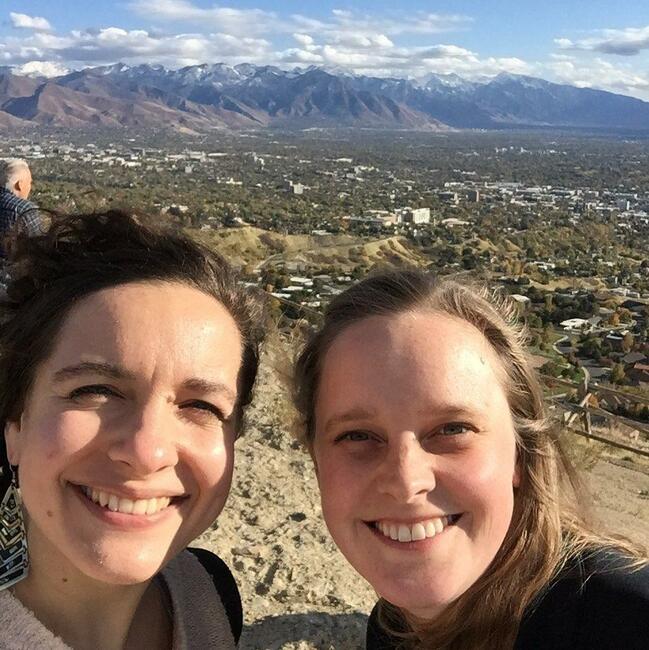
Featured Interviews from 2019
With a team of interviewers in the field, we were able to conduct our 1,000th interview this year! Some highlights from this fieldwork:
In our ongoing series featuring interviews with Yiddish writers and their descendants, this year we recorded an oral history with Kenneth Levinson, novelist and grandson of Yiddish writer Celia Dropkin. In his interview, Kenneth talked about his memories of his grandmother, what he has learned about her through writing his novel, and his thoughts on why she still resonates today, particularly with the queer community.
Fiddler on the Roof (A Fidler Afn Dakh) has taken the theater world by storm, so we were very excited to have the chance to record an oral history with stand-up comedian and actor Jackie Hoffman, who plays Yente the matchmaker in the off-Broadway production. In her interview, Jackie reflected on the influence her Orthodox upbringing has had on her performance, as well as the experience of performing in Yiddish, and shared thoughts on the reception the musical’s Yiddish revival has received.
This year we also had the treat of interviewing veteran actor Elliott Gould, who has been acting since he was a child. In his interview, Elliott recalled what it was like growing up Jewish in Brooklyn in the 1940s, told us about the first time he met Barbra Streisand when she auditioned for the musical I Can Get It for You Wholesale, and philosophized about the concept of balance.
We were lucky enough that right in our own backyard was a narrator for our interview series on Yiddish theater history: Melanie Lewis, great-niece of Yiddish actor and founder of the NYC Yiddish Art Theatre, Maurice Schwartz, and former volunteer docent at the Yiddish Book Center. In addition to giving us a window into her great-uncle’s public persona, Melanie provided insights into Schwartz’s background and personality and his extended family, all of whom worked at his Yiddish Art Theatre in some capacity.
Zikhroynom Livrokhe, Remembering Past Narrators
We were saddened to learn of the passing of some of our narrators. May their memory be for a blessing.
Emile Karafiol, z”l, attorney, passed away on January 16. Born in 1935 in Warsaw, Poland, his family fled Nazi persecution, eventually settling in Montreal. After over a decade as a professor of European history at the University of Chicago, Emile switched careers, earning a law degree. In 2004, after visiting his cousin’s grave in the Warsaw Jewish Cemetery, Emile was inspired to start the Warsaw Cemetery Project to create a searchable database of every gravestone with a photograph of the inscription on each stone. In his interview, he told stories of his mother’s youth and his work in Poland, and he reflected on the place of Yiddish in the world today. Watch the full interview and excerpts.
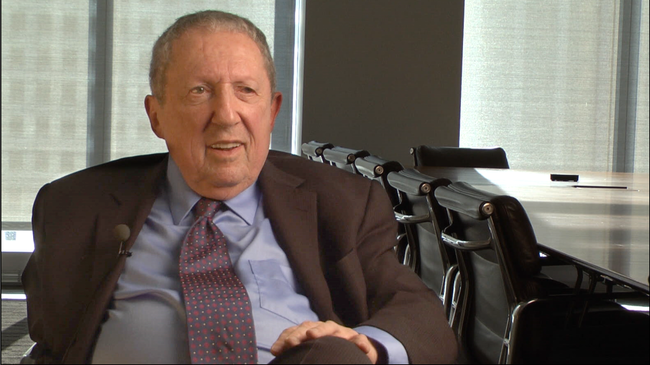
Melvin Meister, z”l, retired biomedical engineer, died on April 5. Born in Boston in 1928 to Jewish immigrants, Melvin grew up in a Jewish home with an observant mother and atheist father who spoke Yiddish. After serving in the army, Melvin became a biomedical engineer and worked at Massachusetts General Hospital for nearly fifty-five years. In his interview, Melvin recalled the professional hardships he faced as a member of the Communist Party during the McCarthy Era of the 1950s. His advice to younger generations: Live your life! Watch his interview.
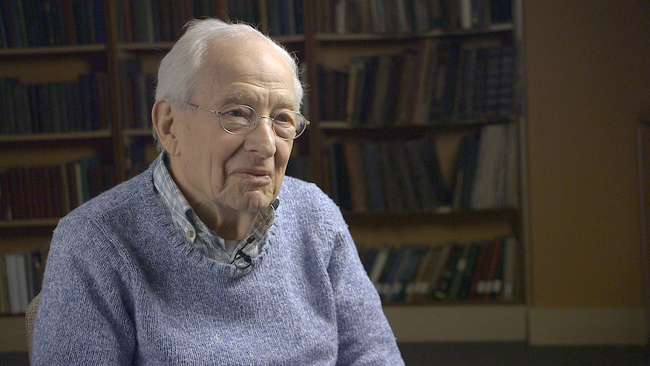
Fred David, z”l, passed away on May 11. In his interview, he described growing up before World War II in the small rural Jewish community of Hamm an der Sieg, Germany, where he was born in 1927 to a family of cattle farmers. Fred’s family fled Germany after Kristallnacht, eventually settling in Kansas City, Missouri. Fred served in the US Army Air Corps for three years during WWII and then went on to become a veterinarian. He and his wife of fifty years, a Holocaust survivor, spent their lives caring for animals and running animal hospitals in Illinois and then Los Angeles. Watch his full interview and excerpts.
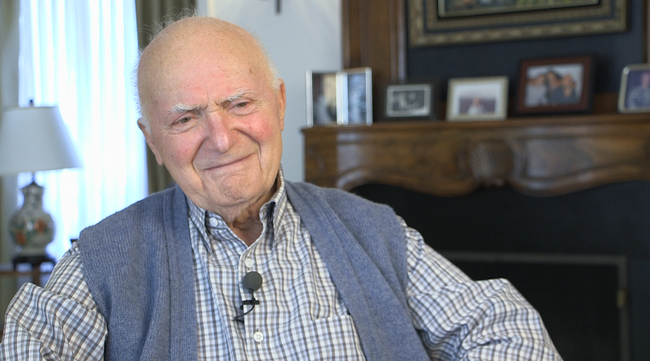
David Simon, z"l, son of son of Yiddish author and Jewish educator Solomon Simon, died on June 6. Born in 1924 in Brooklyn, NY, David grew up immersed in the Yiddish world of his father, and attended the Sholem Aleichem fokshule. After attending Cornell, David spent several years serving in the U.S. military and eventually attended Harvard Law school. A Yiddish speaker, David translated several of his father's works from Yiddish into English. Throughout his life, David was committed to his father's legacy and ensured that his father's works and memory would be passed on for generations to come. Watch his full interview and excerpts.
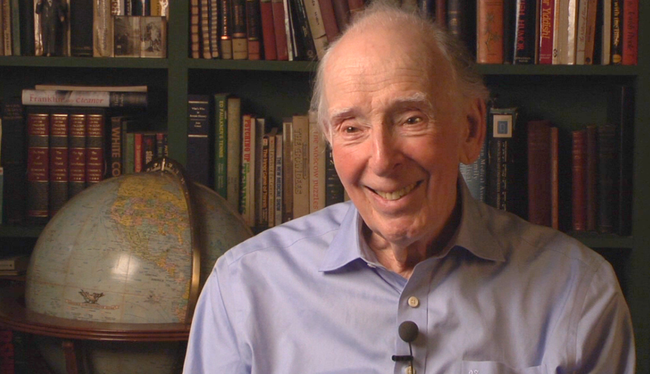
Velvel Pasternak, z”l, musicologist and major publisher of Jewish music, died on June 11. Born in 1933 in Toronto to Polish immigrant parents, Velvel received both a secular and Jewish religious education, eventually receiving degrees from Yeshiva University, Julliard, and Columbia University. In the late 1960s, he realized the need to formally record Hasidic music and set out visiting the Hasidic communities of New York City to record their largely untranscribed musical traditions, about which he shared anecdotes in his interview. In addition to his work with Hasidic music, he also published around 200 collections of Jewish music including Yiddish and Israeli folk tunes, klezmer, and Sephardic melodies. Watch his full interview and excerpts.
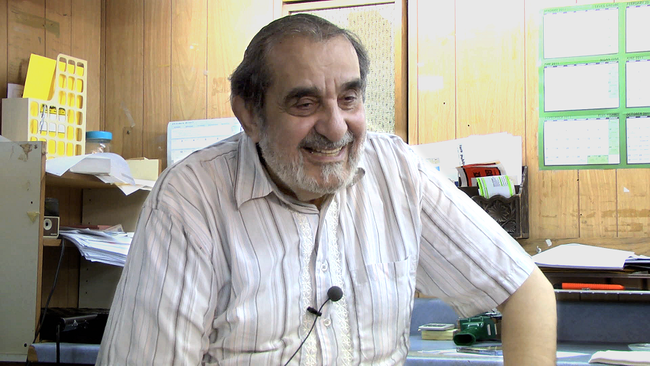
Markle Karlen, z”l, retired medical doctor, passed away on September 25. Born in 1924 in Minneapolis, Markle graduated high school at the age of fifteen and graduated from the University of Minnesota Medical School by age twenty-two. Markle joined the army in the late 1940s and was put in charge of overseeing a leper colony in Yokohama, Japan. A lifelong Yiddishist, Markle was actively involved in Yiddish cultural activities in his Minneapolis community, teaching Yiddish after minyan and participating in a Yiddish group at the Minneapolis Jewish Community Center. Watch his interview.
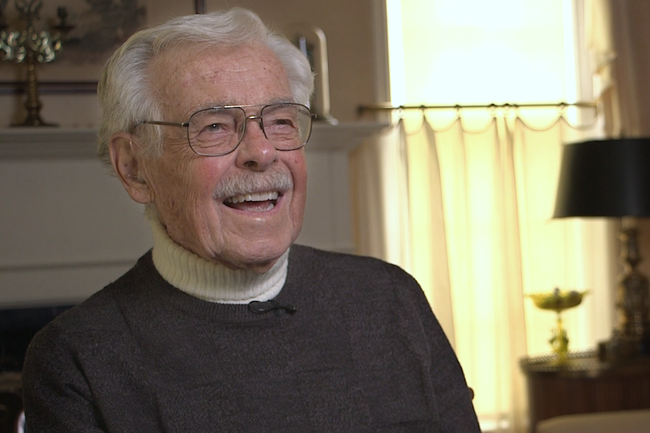
Harold Bloom, z’’l, literary critic, died on October 14, just weeks after we interviewed him at his home in New Haven, Connecticut, where he taught at Yale University for six decades. Born in 1930 in the Bronx to Orthodox parents, he grew up in a Yiddish-speaking home and community, reading Yiddish books and—as he fondly recounted in his interview—seeing Yiddish plays at the Second Avenue Theater with his sisters, including Yiddish productions of Shakespeare starring the famous Maurice Schwartz. Despite becoming one of the most famous literary critics of the Western canon, his interview revealed that Yiddish played a major role in shaping his world view, and he continued to read and admire Yiddish literature throughout his life. Watch his full interviews and excerpts.
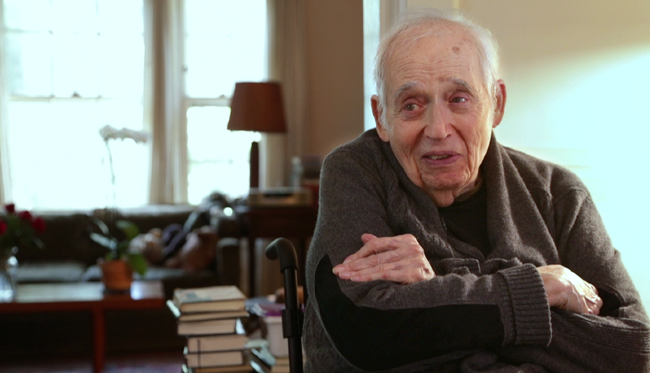
Anabella, z”l, Yiddish actress, passed away on November 21. Born in Czernowitz, she moved to Bucharest after WWII, where she attended theater school and learned to sing and dance. She later immigrated to Israel and continued her acting career, eventually joining Yiddish actor Shimon Dzigan’s troupe—with whom she would tour for over thirty years. Anabella was optimistic about the future of Yiddish theater and Yiddish culture and was awarded a Lifetime Achievement Award from the National Authority for Yiddish Culture only two days before her death. Watch her full interviews and excerpts.
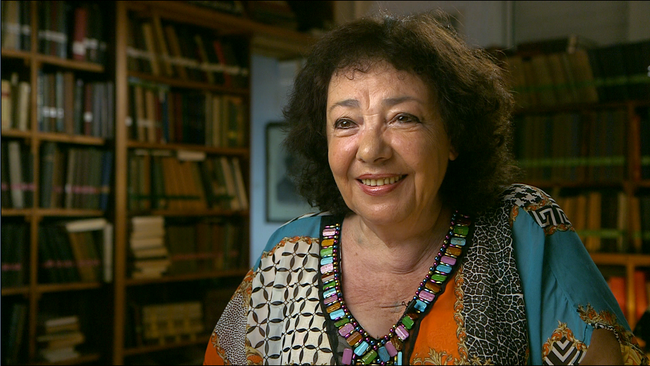
Highlights from a Decade of Oral History
February 2020 marks ten years since we recorded our first interview as part of the Yiddish Book Center’s Wexler Oral History Project. Since then, we’ve recorded over 1,000 interviews on five continents. Here are some highlights from our work over the past decade:
To continue following along with our work as it develops:
- subscribe to our weekly emailer at yiddishbookcenter.org/oral-history/updates
- subscribe to our YouTube page @yiddishbookcenter to be notified whenever we upload new interview highlights
- follow us on social media for weekly content on Twitter at @YiddishStories, Facebook at facebook.com/WexlerOralHistoryProject, and Instagram at @yiddish_stories
- and, of course, browse our full collection or search for something specifically of interest to you on our website anytime at yiddishbookcenter.org/tell-your-story

